A group of 10 Republican senators on Sunday called on President Joe Biden to throw his support behind their own Covid-19 relief package framework, asking the President to work with them on drafting the legislation.
In a letter sent to Biden, the lawmakers -- including Sens. Susan Collins of Maine, Lisa Murkowski of Alaska, Mitt Romney of Utah and Rob Portman of Ohio -- told Biden they "welcome the opportunity to work with (him) in a bipartisan manner to combat the Covid-19 virus and provide continued support to families struggling during the pandemic."
"In the spirit of bipartisanship and unity, we have developed a Covid-19 relief framework that builds on prior Covid assistance laws, all of which passed with bipartisan support," they wrote.
These are the 10 Republicans who signed onto the letter to Biden:
Sen. Susan Collins, R-Maine

Sen. Susan Collins, R-Maine
Sen. Mitt Romney, R-Utah

Sen. Mitt Romney, R-Utah
Sen. Lisa Murkowski, R-Alaska

Sen. Lisa Murkowski, R-Alaska
Sen. Rob Portman, R-Ohio

Sen. Rob Portman, R-Ohio
Sen. Bill Cassidy, R-La.
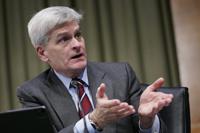
Sen. Bill Cassidy, R-La.
Sen. Shelley Moore Capito, R-W.Va.

Sen. Shelley Moore Capito, R-W.Va.
Sen. Todd Young, R-Indiana

Sen. Todd Young, R-Ind.
Sen. Jerry Moran, R-Kansas
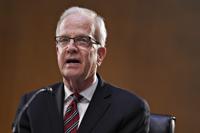
Sen. Jerry Moran, R-Kan.
Sen. Mike Rounds, R-S.D.
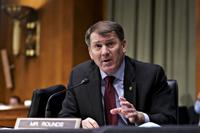
Sen. Mike Rounds, R-S.D.
Sen. Thom Tillis, R-N.C.
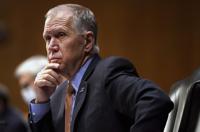
Sen. Thom Tillis, R-N.C.
The senators said their framework includes a total of $160 billion for vaccine development and distribution, testing and tracing, and treatment and supplies, including the production and deployment of personal protective equipment.
The framework also includes $4 billion to bolster behavioral health and substance abuse. It would also include a new round of direct payments for "families who need assistance the most" and extend enhanced federal unemployment benefits at the current level.
Brian Deese, the director of the White House's National Economic Council, confirmed on CNN's "State of the Union" later Sunday that the White House had received the letter.
"We've received the letter and we certainly will be reviewing it over the course of the day," Deese said. "What I will say is that the provisions of the President's plan, the American Rescue plan, were calibrated to the economic crisis that we face."

A group of 10 Republican senators have called on President Joe Biden to throw his support behind their own Covid-19 relief package framework.
The President, he added, is "uncompromising when it comes to the speed we need to act at to address this crisis."
The proposal comes as Biden has suggested he's open to passing major portions of his $1.9 trillion Covid relief proposal through a procedural tactic known as reconciliation if Republicans refuse to move on the measure. The maneuver would mean the package would just need a simple Senate majority of 51 votes, rather than 60.
"We request the opportunity to meet with you to discuss our proposal in greater detail and how we can work together to meet the needs of the American people during this persistent pandemic," the group wrote to Biden, adding: "We recognize your calls for unity and want to work in good faith with your Administration to meet the health, economic, and societal challenges of the Covid crisis."
The letter's other signatories are GOP Sens. Bill Cassidy of Louisiana, Shelley Moore Capito of West Virginia, Todd Young of Indiana, Jerry Moran of Kansas, Mike Rounds of South Dakota and Thom Tillis of North Carolina.
Biden's proposed package, meanwhile, expands on many of the proposals in Congress' $3 trillion coronavirus relief bill from March and the $900 billion legislation from December, which was scaled back to garner bipartisan support in the Senate.
While Biden has said he is willing to consider less than $1.9 trillion in relief, White House officials made clear they are not interested in splitting up the legislation by getting a bipartisan vote on some aspect and then passing a separate package along party lines using reconciliation.
Here is Biden's $1.9T virus relief plan
Intro

President-elect Joe Biden is proposing a $1.9 trillion plan to expand coronavirus vaccinations, help individuals and jump-start the economy. The plan, which would require congressional approval, is packed with proposals on health care, education, labor and cybersecurity. Here's a look at what's in it:
$20 billion to establish community vaccination centers

A $20 billion national program would establish community vaccination centers across the U.S. and send mobile units to remote communities. Medicaid patients would have their costs covered by the federal government, and the administration says it will take steps to ensure all people in the U.S. can receive the vaccine for free, regardless of their immigration status.
$50 billion to expand testing

An additional $50 billion would expand testing efforts and help schools and governments implement routine testing. Other efforts would focus on developing better treatments for COVID-19 and improving efforts to identify and track new strains of the virus.
$1,400 stimulus checks to Americans

Stimulus checks of $1,400 per person in addition to the $600 checks Congress approved in December. By bringing payments to $2,000 — an amount Democrats previously called for — the administration says it will help families meet basic needs and support local businesses.
Unemployment benefits and eviction moratorium extension

A temporary boost in unemployment benefits and a moratorium on evictions and foreclosures would be extended through September.
Paid sick leave requirement
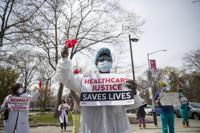
An emergency measure requiring employers to provide paid sick leave would be reinstated. The administration is urging Congress to keep the requirement through Sept. 30 and expand it to federal employees.
Child care tax credit

The child care tax credit would be expanded for a year, to cover half the cost of child care up to $4,000 for one child and $8,000 for two or more for families making less than $125,000 a year. Families making between $125,000 and $400,000 would get a partial credit.
$40 billion for child care subsidies, centers

$15 billion in federal grants to help states subsidize child care for low-income families, along with a $25 billion fund to help child care centers in danger of closing.
$15 per hour federal minimum wage

The federal minimum wage would be raised to $15 per hour from the current rate of $7.25 per hour.
$130 billion for K-12 schools for reopening

$130 billion for K-12 schools to help them reopen safely. The money is meant to help reach Biden's goal of having a majority of the nation's K-8 schools open within his first 100 days in the White House. Schools could use the funding to cover a variety of costs, including the purchase of masks and other protective equipment, upgrades to ventilation systems and staffing for school nurses. Schools would be expected to use the funding to help students who fell behind on academics during the pandemic, and on efforts to meet students' mental health needs. A portion of the funding would go to education equity grants to help with challenges caused by the pandemic.
$35 billion for public colleges and universities

Public colleges and universities would get $35 billion to cover pandemic-related expenses and to steer funding to students as emergency grants. An additional $5 billion would go to governors to support programs helping students who were hit hardest by the pandemic.
$15 billion in grants to small businesses

$15 billion in grants to more than 1 million small businesses that have been hit hard by the pandemic, as well as other assistance.
$350 billion for front-line workers

$350 billion in emergency funding for state, local and territorial governments to help front-line workers.
$20 billion for public transit

$20 billion in aid to public transit agencies.
Cybersecurity updates, expansion

$9 billion to modernize information technology systems at federal agencies, motivated by recent cybersecurity attacks that penetrated multiple agencies.
$690 million to boost federal cybersecurity monitoring efforts and $200 million to hire hundreds of new cybersecurity experts.
CNN's Devan Cole contributed to this report.
January 31, 2021 at 09:45PM
https://ift.tt/36qVfsc
10 GOP senators offer COVID-19 relief counterproposal, request meeting with Biden - Buffalo News
https://ift.tt/3d5QSDO

No comments:
Post a Comment